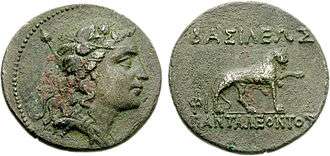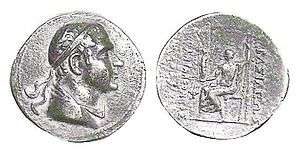Pantaleon
| Pantaleon | |
|---|---|
| Indo-Greek king | |
|
King Pantaleon in profile, with Zeus on the reverse. | |
| Reign | 190–180 BCE |

Obv: Bust of Dionysos with a wreath of leaves.
Rev: Panther with a small bell around the neck, touching a vine with the left leg. Greek legend: BASILEOS PANTALEONTOS "Of King Pantaleon".
Pantaleon (Greek: Πανταλέων) was a Greek king who reigned some time between 190–180 BCE in Bactria and India. He was a younger contemporary or successor of the Greco-Bactrian king Demetrius, and is sometimes believed to have been his brother and/or subking. He was the first Greek king to strike Indian coins, peculiar irregular bronzes which suggests he had his base in Arachosia and Gandhara and wanted support from the native population.

The limited size of his coinage indicates a short reign. Known evidence suggests that he was replaced by his (probable) brother or son Agathocles, by whom he was commemorated on a "pedigree" coin. Some of his coins (as well as those of Agathocles and Euthydemus II) have another surprising characteristic: they are made of copper-nickel alloy, a technology that would not be developed in the West until the 18th century, but was known by the Chinese at the time. This suggests that exchanges of the metallic alloy or technicians happened between China and the region of Bactria.
External links
| Preceded by Demetrius I |
Indo-Greek Ruler (Arachosia, Gandhara) 190–185 BCE |
Succeeded by Apollodotus I |
- ↑ O. Bopearachchi, "Monnaies gréco-bactriennes et indo-grecques, Catalogue raisonné", Bibliothèque Nationale, Paris, 1991, p.453

